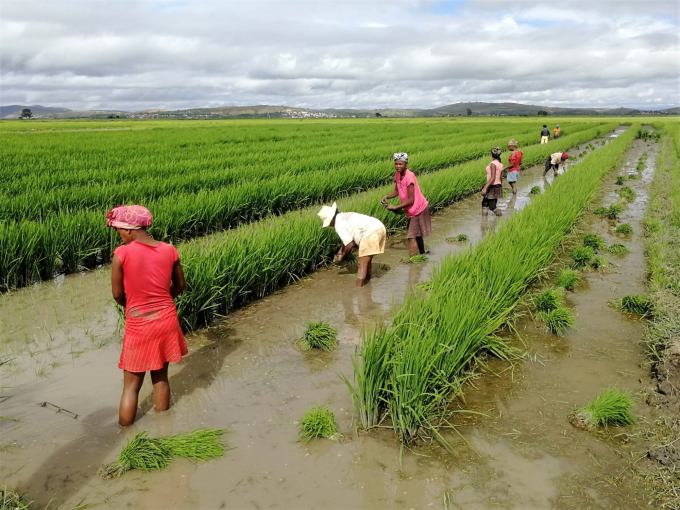May 18, 2025 | 20:13 GMT +7
May 18, 2025 | 20:13 GMT +7
Hotline: 0913.378.918
May 18, 2025 | 20:13 GMT +7
Hotline: 0913.378.918

The FAO-China SSC Programme has reached more than 100,000 direct beneficiaries and several hundred thousand indirect beneficiaries
©FAO/Fanilo Randriatsizafy
The Food and Agriculture Organization of the United Nations (FAO) has signed an agreement with the Chinese Government officially launching Phase III of the FAO-China South-South Cooperation (SSC) Programme.
The General Agreement was signed by the Director-General of FAO, QU Dongyu and the Minister of Agriculture and Rural Affairs of the People’s Republic of China,TANG Renjian.
It followed the announcement by Chinese President Xi Jinping in September 2020 of an additional $50 million in funding for the Programme.
President Xi made the pledge during a video address to the general debate of the United Nations General Assembly.
The agreement underlines “China’s effort to prioritize the development of agriculture and rural areas through the ongoing rural revitalization strategy” and FAO’s mandate in food security and nutrition, agriculture, fisheries, and forestry, “including providing technical assistance to its Members in the field of sustainable development and resilient livelihoods.”
“This is an important agreement, both in terms of synergy between China’s experience and FAO’s priorities and also for China’s continuous contribution to promoting South-South and Triangular Cooperation, to transform agrifood systems and to achieve Better Production, Better Nutrition, a Better Environment and a Better Life for all, leaving no-one behind,” FAO Director-General QU Dongyu said.
The overarching goal of Phase III of the FAO-China SSC Programme is to support developing countries in achieving sustainable agrifood systems transformation and to contribute to the implementation of the 2030 Agenda and Sustainable Development Goals (SDGs), especially SDG1 and SDG2.
Phase III of the FAO-China SSC Programme covers six key thematic areas: agricultural production and productivity; value chains and trade; tropical agriculture and dryland farming; resilience building; emergency response, and global governance and traditional agricultural areas. Special focus will also be given to food loss and waste, innovation and digital agriculture, among others.
Substantial results
In 2009, the FAO-China SSC Programme was established with an initial contribution of $30 million for Phase I, allowing exchanges of knowledge and experience between China and other countries of the global South. In 2015, China contributed an additional USD 50 million for Phase II of the Programme.
The FAO-China SSC Programme has achieved substantial results to date. Under this flagship South-South and Triangular Cooperation Programme, a total of 25 national, regional, inter-regional and global projects have been implemented to support agricultural development and food security in line with countries’ priorities and needs. The Programme has reached more than 100,000 direct beneficiaries and several hundred thousand indirect beneficiaries at grassroots level in rural areas. Chinese experts fielded in host countries have transferred practical and adaptable technologies by providing demand-driven demonstrations and trainings in collaboration with local counterparts.
In addition to the field projects, more than 50 global capacity development events and activities have been organized with the participation of thousands of government officials, technical experts, small-scale farmers and other stakeholders from over 100 FAO’s member states.
FAO's role in South-South and Triangular Cooperation
The successful introduction of new technologies through SSTC in many countries has contributed to increased food security, especially through the improvement of agricultural productivity, diversification of food crops, small animal and fish production, and rural incomes.
Over the past two decades, a total of $435 million has been invested in SSTC projects and activities.
(FAO.org)

(VAN) Fourth most important food crop in peril as Latin America and Caribbean suffer from slow-onset climate disaster.

(VAN) Shifting market dynamics and the noise around new legislation has propelled Trouw Nutrition’s research around early life nutrition in poultry. Today, it continues to be a key area of research.

(VAN) India is concerned about its food security and the livelihoods of its farmers if more US food imports are allowed.

(VAN) FAO's Director-General emphasises the need to work together to transform agrifood systems.

(VAN) Europe is facing its worst outbreak of foot-and-mouth since the start of the century.

(VAN) The central authorities, in early April, released a 10-year plan for rural vitalization.

(VAN) Viterra marked a significant milestone in its carbon measurement program in Argentina, called Ígaris, reaching 1 million soybean hectares measured.